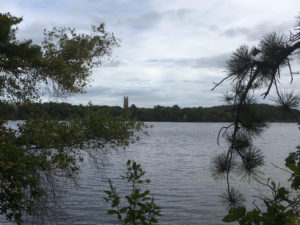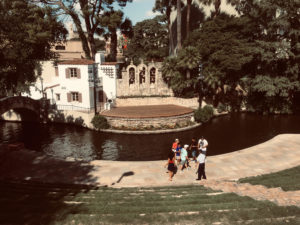Week Ten: Wellesley College, Massachusetts
By Kaffe Keating
“Live life fully, with gratitude, kindness, determination and joy!”
– Adina Shira Kletter
I need to get these lyrics into my brain. And somehow simultaneously clear my head, just decompress a bit. The vaguely familiar climate and landscape, though still quintessentially American (there are chipmunks), should hopefully help to ease the sensory overload of the last month.
I’m trudging around the serene Lake Woban upon whose banks rests Wellesley College, its towers soaring above the woods which shade and shelter the paths below. It’s a truly beautiful place, and the New England weather makes me feel right at home. Wellesley is historically a women’s college, founded in the year 1875 and which boasts a very impressive alumni. Hillary Rodham Clinton is the one you hear about the most, but I was personally more excited to learn that Norah Ephron went here; I grew up on When Harry Met Sally.
The school song, dedicated to Wellesley’s Alma Mater, is what’s brought me out to the lake. We had the idea back in Brixton to open the second half of the show with Feste, Olivia’s jester, busking for the audience – with the song he plays varying from college to college. In Notre Dame and then Austin it was the respective college football fight songs (which you need to get word perfect, as everyone knows them) and in San Antonio it was the old classic “San Antonio Rose.” Here, it’ll be the aptly named “To Alma Mater;” since Wellesley doesn’t have a college football team, there wasn’t a fight song to learn. It’s instead a song encouraging Wellesley students of past and present to sing about the beauty of their college. It’s quite a nice break to learn a song which isn’t all about destroying people and instead focuses on a much-loved place which has been treasured by generations.
I mutter the lines to myself as I set off on a clockwise route from the College Club where we’re staying (we can walk to our classes from here, which is a dream), pausing every so often in my recital so as to avoid alarming the walkers passing me in the opposite direction. I’m approaching this like I would some Shakespearean verse, and it’s well written enough that the thoughts all make sense in sequence. A general rule of thumb: the better written something is, the easier it is to learn. I’ll marry the lyrics with the guitar part later.
I bump into one of the students walking in the opposite direction, Tati, who’s been helping us out in the theatre. They’re all ferociously intelligent, the women who attend this college; I gather it’s incredibly difficult to get accepted, especially in more recent decades with Wellesley making a conscious effort to attract students from a wider range of backgrounds. Tati’s currently working on the design for the show currently being rehearsed in the studio below the theatre we’ll be playing in in Alumnae Hall. It’s called Stupid Fucking Bird, a modern adaptation of Chekhov’s The Seagull. I love Chekhov, as it’s so different to Shakespeare; in Shakespeare everyone stands and pretty much says what they mean, whereas in Chekhov they hardly ever do. It’s a shame we won’t be here to see Tati’s design on stage.
I have a class with some of the other design students this week, on ‘How to make a play that fits into a suitcase.’ We start with a few exercises to do with saying ‘yes’ and working collaboratively. There’s a relatively simple exercise called ‘Yes, and…’ which is meant to teach people to accept and build on one another’s ideas. First, in a circle, we all tell a story together taking responsibility for a sentence each. The story will inevitably meanders off into somewhere bizarre, as each person feels the pressure to be interesting and to say something more imaginative than what came before. Then you try it again, but this time everyone has to begin their sentence with the words ‘Yes, and…’ and attempt to use the details of what’s come before to move their section of the story forward.
The difference is immediate; where first we had a bizarre and nonsensical story which started off with a main character who disappeared half-way through the plot, the second time through the students all worked together to create a truly touching tale of a young girl who, after discovering a porpoise which had been washed up on a beach, went on to have her first experience facing the concept of mortality. That was on their first go with the ‘yes, and’ rule. It was meant to be a stupid improv game but that’s what they came up with… This sets the students in good stead for the rest of the workshop, which has them using props they’ve brought in to represent completely different items and then using those skills to set their own version of scenes from Twelfth Night. Hilariously, about half of them have brought umbrellas with them to use, which mirrors our play nicely.
I must be about half way round the lake by now. I think I can see where I set off from on the
opposite side, over in the distance. Tati told me the walk should take no longer than an hour and fifteen minutes but I’ve not exactly been rushing. The words are going in but knowing them when you’re rambling around on your own is one thing; knowing them on stage, under lights and in front of a few hundred people is entirely another.
To say I’m regretting going along with this particular choice, of having to learn a new song from scratch and perform it every week, is maybe a bit far, but it’s definitely proving more work than I’d initially thought when we first decided to do this back in the heady days of rehearsals. However, extra work that it is, learning the lyrics of this particular song has given me a deeper appreciation of this campus and the country in which it’s nestled. “Oh changeful sky, bend blue above her” rounds out the first verse, urging the tempestuous New England element to shine kindly down on the college grounds and buildings below.
One such building is a replica of William Shakespeare’s house in Stratford-upon-Avon. You’re walking through the campus on the way to a class when you round a corner and there, in the middle of a wood in Massachusetts, is a little Elizabethan cottage. It’s home to Wellesley’s own Shakespeare Society, founded only two years after the college itself. The basement is full of costumes and props and stage swords, with an actual stage installed on the top floor upon which the society puts on plays from Shakespeare’s canon. Despite the traditional setting, the casting of the shows is in direct opposition to Elizabethan tradition; the plays are only performed by students and so the company is always all-female. Again, it’s frustrating to not be able to stick around long enough to see their upcoming production of Much Ado About Nothing which sounds like it’s going to be very interesting indeed.
There’s something so unique about this place. Men aren’t exactly absent; there are plenty of male members of staff, but the usual prevalent feeling in the rest of the world of male dominance, male default, certainly is. It’s difficult to tell if it’s just the reprieve from the Texas heat, or the picturesque setting I’ve found myself in that’s bringing this clear sense of calm, but I suspect there’s also something in the feeling of shelter from a world that is governed by the flow of testosterone. How long that will last though, especially when some of the women we’ve met at this college get their go in the world, remains to be seen.
I’ve made it to a bench. I’m pretty sure I’m at least three quarters of the way round now. Looking down, there’s a plaque underneath honouring the memory of a certain Adina Shira Kletter. An epitaph at the bottom reads: “Live life fully, with gratitude, kindness, determination and joy!” I have no idea who Adina Kletter was, but the exclamation mark makes me feel like this is a direct quote of hers. Fine words to live by indeed.
We’ll be here for a few more days and then we’ll be off again. Flying out to another part of this huge country. With only a week in each college, there’s never enough time to truly put down roots, to allow any moss to form before the stone rolls inevitably on to its next brief resting place. We have to make the most of these moments of serenity and calm where we can get them, and there are few better spots for that than this.
But I can’t stay too long, we’ve got a show tonight. I’ll sit here for a bit longer, but then I’ll have to go.







